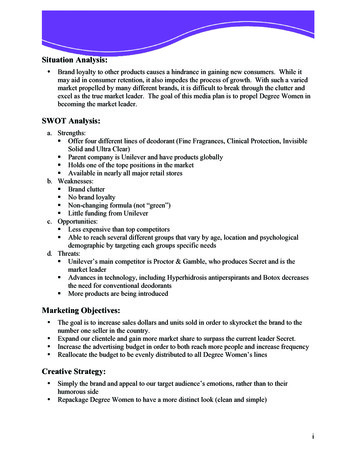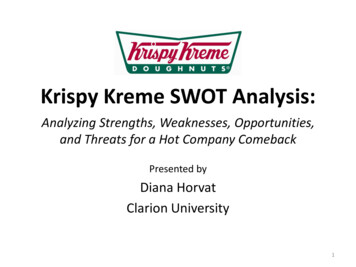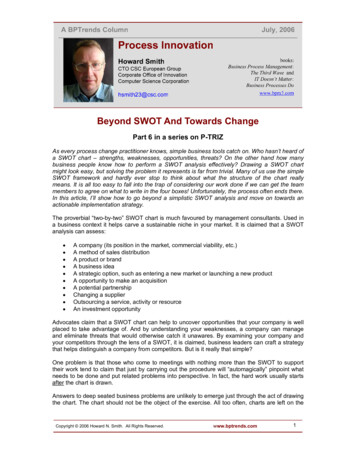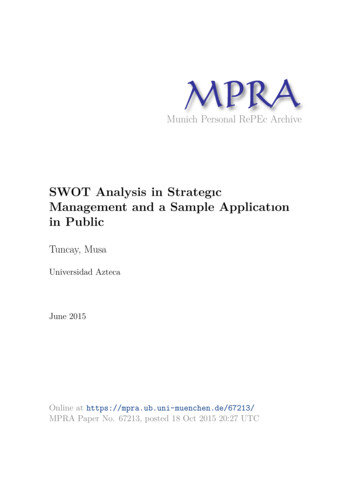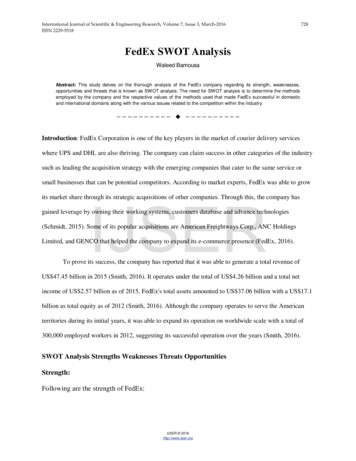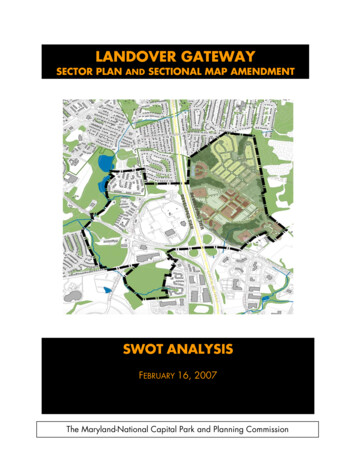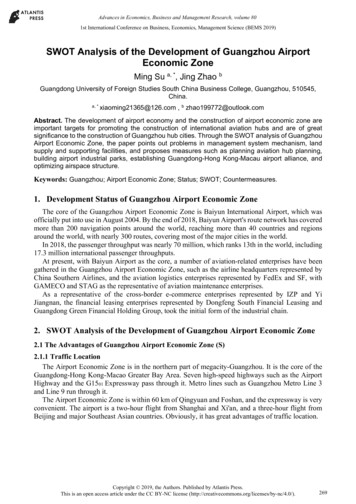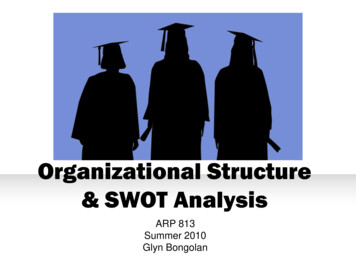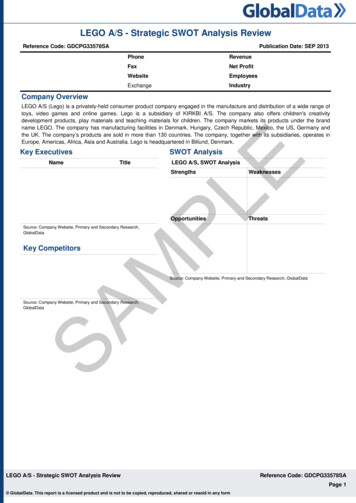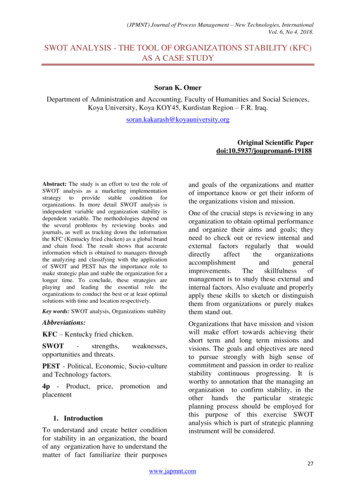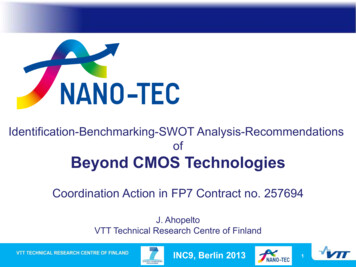
Transcription
Identification-Benchmarking-SWOT Analysis-RecommendationsofBeyond CMOS TechnologiesCoordination Action in FP7 Contract no. 257694J. AhopeltoVTT Technical Research Centre of FinlandINC9, Berlin 20131
PROJECT PARTNERSJouni AhopeltoAlain CappyIsabelle Ferain/Georgios Fagas(J-P Colinge)Piotr GrabiecMart W GraefWladek Grabinski (A Ionescu)Guilhem LarrieuAndroula NassiopoulouRalf PoppWolfgang RosenstielClivia M Sotomayor TorresThomas SwahnHelena TheanderChristian Pithan (R Wasser)Dag WinklerINC9, Berlin 20132
OUTLINE Motivation Methodology International Cooperation Examples of outcome SummaryINC9, Berlin 20133
MOTIVATION CMOS era coming to its end? Probably not in coming tens of years Large number of emerging ”Beyond CMOS” device concepts Can those be used for data processing(computation/memory/interconnects )? Device fabrication: Manufacturability? Variability? Reliability? Architectures, design tools, libraries?INC9, Berlin 20134
PROJECT CONCEPTAim is to: Identify, benchmark and SWOTanalyse the emerging deviceconcepts and technologies Bridge the gap between theemerging technologies anddesign Provide recommendations forfuture actions in this field inEuropeINC9, Berlin 20135
METHODOLOGYSeries of Workshops was arranged to carry out the missionIdentifyTechnologiesand Designs fornew devices towork&SWOT ofresearch tools(M08)Benchmark ofnew B-CMOSdevice/designconceptsincluding design(M14)SWOT analysisof benchmarkeddevices anddesigns(M20)Report onTechnologydesigncommunity&recommendations on combinedTEC-DES ecosystem(M24)Input from broad range of experts was collected Academia; EU projects on nanoelectronics, literature, conferences, positionpapers Research organisations; LETI, IMEC, SRC (ITRS) Industry; IBM, HP, MicronRecommendations NANO-TEC consortiumINC9, Berlin 20136
METHODOLOGYIn the Workshops: Invited talks on various fields Speakers from Europe, US and AsiaDiscussantsRapporteursWorking groupsPanels Advisory BoardIdentifyTechnologiesand Designs fornew devices towork&SWOT ofresearch tools(M08)Benchmark ofnew B-CMOSdevice/designconceptsincluding design(M14)First excercise toIdentify/Benchmark/SWOTBeyond CMOS devices inEuropeSWOT analysisof benchmarkeddevices anddesigns(M20)INC9, Berlin 2013Report onTechnologydesigncommunity&recommendations on combinedTEC-DES ecosystem(M24)7
NANO-TEC Advisory BoardLivio Baldi(Micron)Michel Brillouet(CEA-LETI)Roger deKeersmaecker(IMEC)Danilo Demarchi(Polytechnic UnivTorino)Very engaged board members!INC9, Berlin 20138
NANO-TEC WORKSHOP SERIESWS1:IdentifyTechnologies& Designs fornew devicesto workGranada, 20-21 January 2011INC9, Berlin 20139
NANO-TEC WORKSHOP SERIES: WS1SpeakersNanotechnology trends forthe next decadeJ Welser, SRCCompound semiconductorbased electronicsW Stanchina, PittsburgCarbon-based electronicsJ.-Sun Moon, HPBridge to DesignP Lugli, TU MünchenSilicon-based electronicsM Brillouet, CEA LETIAnalogue-Mixed signaldesignH Graeb, TU MünchenSpintronicsS Valenzuela, ICNMolecular Electronics/Quantum ComputersG Wendin, ChalmersINC9, Berlin 201310
NANO-TEC WORKSHOP SERIESWS2:Benchmark ofnew BeyondCMOS deviceand designconceptsAthens,12-14 October 2011INC9, Berlin 201311
NANO-TEC WORKSHOP SERIES: WS2SpeakersMolecular ElectronicsD Vuillaume, CNRSMEMSLina Sarro, TU DelftSolid State QuantumComputingJaw-Shen TsaiNEC &The Riken InstituteNanowiresHeike Riel, IBM ZurichMemristorsJ Grollier, CNRS-ThalesGrapheneJ Kinaret, ChalmersUniversity of TechnologySpintronicsJ Åkerman,Gothenburg U & NanoSCINC9, Berlin 201312
NANO-TEC WORKSHOP SERIES: WS2Panel discussion on how new deviceconcepts could meet the needs set by thedesign community and vice versaSandip TiwariLars HedrichPaolo LugliChairDan HerrINC9, Berlin 2013Diederik Verkest13
NANO-TEC WORKSHOP SERIESWS3:SWOTanalysis ofbenchmarkeddevices anddesignsLausanne, 30-31 May 2012INC9, Berlin 201314
NANO-TEC WORKSHOP SERIES: WS3SpeakersSolid-state QuantumComputing Goran Wendin,Chalmers, GothenburgMolecular Electronics Prof.Dr. Sense Jan van derMolen, Leiden Univ.Graphene Prof. Dr. MaxLemme, KTH, StockholmNanowiresDr. Heike Riel, IBMMEMS Dr. Michael Gaitan,NIST, Gaithensburg, MD,U.S.A.Spintronics Prof. Dr.Charles Gould, University ofWuerzburgNeuromorphic ComputingDr. Julie Grollier, CNRSThales, PalaiseauINC9, Berlin 201315
NANO-TEC WORKSHOP SERIESWS4:Recommendations oncombinedTEC-DESeco-systemBarcelona, 6-8 November 2012INC9, Berlin 201316
NANO-TEC WORKSHOP SERIES: WS4SpeakersNanoelectronics in EUHorizon 2020, Dirk Beernaert,ECPanel Discussion: “DesignTools for Beyond CMOStechnologies” MustafaBadaroglu, IMECResearchSRC views onnanoelectronics, VictorZhirnov, SRCWolfgang Rosenstiel,edacentrum GmbHNeuromorphic computing asa new computing paradigmProf. Dr Simon Thorpe, CNRSPaolo Lugli, Technical Universityof MunichTopological insulators Prof.Dr. Laurens Molenkamp, Univ.WuerzburgSandip Tiwari, Cornell UniversityChair Livio BaldiINC9, Berlin 201317
Position Papers byPosition papers can bedownloaded fromwww.phantomsnet.net/nanoICT/2008 CNTs2010 Nanowires2008 NEMs2009 Modelling2011 Singlemolecule technology2011NanophotonicsNanophononicsINC9, Berlin 20132011Graphene1818
Identifying the Beyond CMOS TechnologiesWS1:IdentifyTechnologies& Designs fornew devicesto workIn the discussions after the Workshop 1the following technologies were selected Molecular Electronics MEMS Solid-State Quantum Computing Spintronics Nanowires Memristors GrapheneINC9, Berlin 201319
Benchmarking exercise in USBernstein et al., Device and Architecture Outlook for Beyond CMOS Switches, Proc. IEEE 98 (2010) 2169.INC9, Berlin 201320
BENCHMARKINGWS2:Benchmark ofnew BeyondCMOS deviceand designconceptsAll the speakes filled the Table in advanceAim to a broader scope: No direct comparisonwith CMOSAllow for otherconcepts in addition todigital switchesChallenge the designcommunityINC9, Berlin 201321
Example: Molecular ElectronicsSAMFETINC9, Berlin 201322
Example: Molecular ElectronicsBenchmarking Beyond CMOS DevicesTechnologyMolecular ElectronicsD. Vuillaume, CNRS & University of LilleOk with SAMFET (to be optimized), 2-terminal junction: low currentGainNoise not yet studied (a few publications)Signal/Noise ratioMolecular junctions are mainly non-linearNon-linearityF. Alibart et. al, Adv. Func. Mater. 20 (2010) 330.SpeedPower consumptionLowLow (50 zJ/mol switching energy)Architecture/Integrability(Inputs/outputs, digital,multilevel, analog, size etc.)Molecule-nanoparticle 2D and 3D arrays could implement somefunctions (e.g. reconfigurable logic, neuro-inspired functions)Other specific propertiesAlmost infinite combination of molecules, adjustable by chemistry,specific design (1 molecule 1 function)Manufacturability(Fabrication processesneeded, tolerances etc.)Solution processing, compatible with flexible substrate.Defect control? Large variability (but not a problem if we envisionartificial neural networks)Timeline(When exploitable or whenforeseen in production) 5 – 10 years (if ever?)INC9, Berlin 201323
SWOT AnalysisWS3:SWOTanalysis ofbenchmarkeddevices anddesignsTables were compiled in the Working Groupsduring the Workshop 3Molecular electronicsINC9, Berlin 201324
Neuromorphic ComputingStrengthsWeaknessesOpportunitiesThreats Low power Speed Non-volatility Possibility of 3T devices(ex atomic switch) New reconfigurable architectures Logic in memory Need to improve OFF/ON ratio Memristors physics Not sufficient enduranceINC9, Berlin 201325
RECOMMENDATIONSWS4:Recommendations oncombinedTEC-DESeco-systemThe Recommendations were drafted in theWorking Groups during the Workshop 4 andfinalised by the RapporteursRecommendations for: Technology and design for information processing inBeyond CMOS Charge-based state variable technologies Non charge-based state variable technologies Technology and Design of new computing paradigms The ecosystem technology in Beyond CMOS in EuropeINC9, Berlin 201326
Download Recommendations From the Web SiteWebsitewww.fp7-nanotec.eu Workshop presentations ”Yellow Pages” Discussion Forum Recommendations Etc.INC9, Berlin 201327
RECOMMENDATIONSFor all state variables, be these charge-based or not, it is recommendedthat research towards a better theoretical understanding of the underlyingphysics and material science of nano-scale devices is supported towardspotential breakthroughs.It is recommended to continue the exploration of novel computation approachesin general. In particular, a comparative and dynamic analysis of the interactionbetween design and the emerging computation technologies as an integral part ofthe R&D efforts would provide Europe with a valuable and probably decisiveadvantage.The consortium finds that strong motivation and support are needed in order tofacilitate communication and cooperation between design and technology actorsfrom academia and industry. The consortium recommends that a couple of pilotprojects are launched addressing explicitly not only the technical aspects but,above all, methodological aspects of this interactions with one or two welldefined examples of novel state variables and a specific application each.INC9, Berlin 201328
Vertical Value ChainProgrammingFor real implementationthe full value chain has tobe pintronicsDevice LevelNanowiresBenchmarking of a single device or conceptis not enough for an IC omputingGrapheneManufacturingMaterialsINC9, Berlin 201329
Ecosystem TechnologyINC9, Berlin 201330
RESEARCH INFRASTRUCTURESEstablish an EuropeanResearch InfrastructureNetwork for BeyondCMOS technologies Research Institutes Academic facilities Flexible processes Relaxed specsINC9, Berlin 201331
SUMMARY First excersise in Europe on BeyondCMOS devices Broadband international cooperation Very open and positive spirit Recommendations NANO-TEC was a start INC9, Berlin 201332
Acknowledgements Speakers, Colleagues in the Panels and AdvisoryCommittee All the participants NANO-TEC Consortium The European Commission (Contract no. 257694)INC9, Berlin 201333
SWOT of research tools Benchmark of new B -CMOS device/design concepts including design SWOT analysis of benchmarked devices and designs Report on Technology-design community & recommendation s on combined TEC-DES eco - system (M08) (M14) (M20) (M24) In the Workshops: Invited talks on various fields Speakers from Europe, US and Asia
